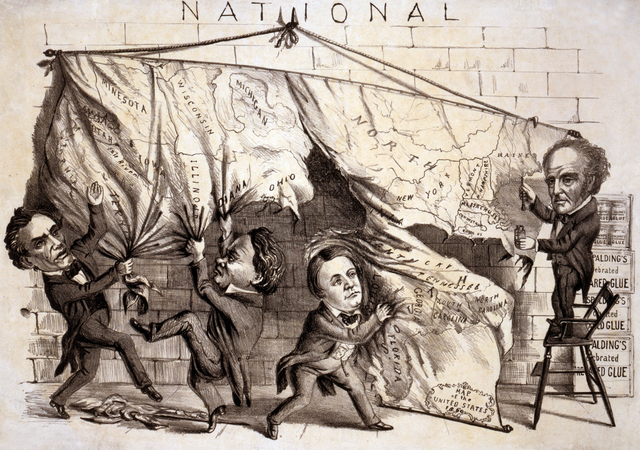About Publications Library Archives
heritagepost.org

Preserving Revolutionary & Civil War History

Preserving Revolutionary & Civil War History

Author: Abraham Lincoln
Date:1858
Annotation:
The critical issues dividing the nation–slavery versus free labor, popular sovereignty, and the legal and political status of African Americans–were brought into sharp focus during the 1858 campaign for U.S. Senator from Illinois. The campaign pitted a little-known lawyer from Springfield named Abraham Lincoln against Senator Stephen A. Douglas, the front-runner for the Democratic presidential nomination in 1860.
Lincoln had been born in 1809 and had grown up on the wild Kentucky and Indiana frontier. At the age of 21 he moved to Illinois where he worked as a clerk in a country store, became a local postmaster and lawyer, and served four terms in the lower house of the Illinois General Assembly. A Whig in politics, he was elected in 1846 to the House of Representatives, but his stand against the Mexican War made him too unpopular to win reelection. After the passage of the Kansas-Nebraska Act in 1854, Lincoln reentered politics, and in 1858, the Republican party nominated him to run against Douglas for the Senate.
Lincoln accepted the nomination with the famous biblical words: “A house divided against itself cannot stand.” Lincoln proceeded to argue that Douglas’s Kansas-Nebraska Act and the Supreme Court’s Dred Scott decision were part of a conspiracy to make slavery lawful “in all the States, old as well as new–North as well as South.” The following fragment, which dates from before the June 1858 Republican Convention, offers an early formulation of the ideas that Lincoln advanced in his House Divided speech.
Document:
Why, Kansas is neither the whole, nor the tithe of the real question.
“A house divided against itself cannot stand”
I believe this government can not endure permanently half slave, and half free.
I expressed this belief a year ago; and subsequent developments have but confirmed me.
I do not expect the Union to be dissolved. I do not expect the house to fall; but I do expect it will cease to be divided. It will become all one thing, or all the other. Either the opponents of slavery will arrest the further spread of it, and put it in the course of ultimate extinction; or its advocates will push it forward till it shall become alike lawful in all the states, old, as well as new. Do you doubt it? Study the Dred Scott decision, and then see, how little, even now, remains to be done.
That decision may be reduced to three points. The first is, that a Negro can not be a citizen. That point is made in order to deprive the Negro in every possible event, of that provision of the U.S. Constitution which declares that: “The citizens of each State shall be entitled to all privileges and immunities of citizens in the several States.”
The second point is, that the U.S. constitution protects slavery, as property, in all the U.S. territories, and that neither congress, nor the people of the territories, nor any other power, can prohibit it, at any time prior to the formation of State constitutions.
This point is made, in order that the territories may safely be filled up with slaves, before the formation of State constitutions, and thereby to embarrass the free state [sentiment, and enhance the chances of slave constitutions being adopted.]
[The third point decided is that the voluntary bringing of Dred Scott into Illinois by his master, and holding him here a long time as a slave, did not operate his emancipation–and did not make him free.]
Source: Gilder Lehrman Institute